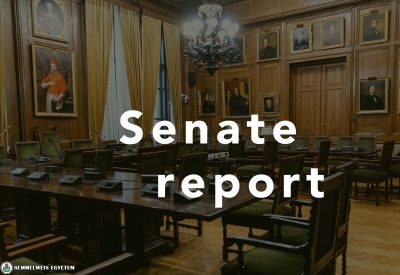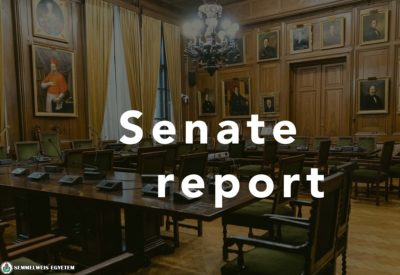The meeting of the Senate was attended by the chairman of the National Foundation for Health and Medical Education, which is the university’s managing body after the model change on August 1, Gábor Orbán, the CEO of Richter Gedeon Nyrt. They were also joined by the elected members of the university’s Public Benefit Supervisory Board (SB), who are invited to the Senate in accordance with the new rules of procedure introduced in the context of the model change. The members of the SB are Professor Emeritus Dr. Zoltán Nagy, chairman, who was the head of the Semmelweis University Consistory until August 1, and Professor Emeritus Dr. Imre Klebovich and Professor Emeritus Dr. Zoltán Szabolcs. At the meeting, Rector Dr. Béla Merkely briefly presented the professional careers of the members of the Supervisory Board.
The Senate adopted the proposal for the establishment of the Semmelweis National Health and Social Accredited Examination Center, which will enable, among other things, the university to conduct the professional examinations of students at vocational training institutions. Following accreditation, the new unit will also be authorized to organize qualifying examinations, which can be provided as a service to courses organized by external adult education providers.
The senators also decided on several proposals to amend the curriculum of medical education that was renewed starting from the 2019/20 academic year, which include structural changes and curricular extensions to ensure the continuous improvement of the curriculum. A package of proposals to facilitate the completion of credits for the ÁOK has been adopted, including an increase from one to two credits for summer internships, and the inclusion in the model curriculum of elective subjects per semester that can be taken more than once (e.g. TDK work, clinical work, demonstrator activities, and the introduction of new subjects on sport and lifestyle, which can be replaced by competitive sport in the university’s sports departments).
It was decided to transfer the Emergency Medicine – Oxyology Departmental Group to the new Department of Emergency Medicine, which was created on May 1. The new clinic will teach three subjects: First Aid I, Emergency Medicine and Oxyology IV, and the six-week Emergency Medicine elective clinical placement in year VI.
For the Faculty of Medicine, it has also been decided to launch a new compulsory elective course from the second semester of the next academic year entitled “Nephrology: from the molecule to the bedside”. It was voted that the six-week clinical internship introduced by the curricular reform in Year VI should also be available at the Department of Maxillofacial Surgery and Dentistry. An Introduction to Patient Care lecture series will also be added to the English and German language courses.
The Senate decided to establish a Psychiatry Departmental Group at the Asklepios Campus Hamburg (ACH), attached to the Department of Psychiatry and Psychotherapy, and to introduce a new course on Clinical Emergencies at the ACH.
The curriculum of the Faculty of Dentistry will also be modified, mostly by adjusting the credit value of courses where it was lower than the number of hours. The number of credits to be completed in 10 semesters will increase from 300 to 311. The new and renewed model curricula of the Faculty of Pharmaceutical Sciences have been approved, based on the experience of the year since the curricular reform, with the aim of facilitating academic progress, ensuring better subject coherence, a more even workload and credit distribution. A decision was taken to modify the curriculum of the Faculty of Health Sciences, also in the context of credit harmonization. This will include, among other things, the teaching of foundation courses in Years I and II, which will be compulsory for all specializations.
The modification of the curriculum of the Institute of Mental Health of the Faculty of Health and Public Administration, for the specialization of lactation counseling, was approved, in the framework of which the previously non-credit basic health courses will be offered as optional courses with a proportional credit value. The curriculum of the Institute of Digital Health Sciences of the EKK has been amended for the specialization in health administration management, including the naming of the English language courses.
The senators decided on the university staff members nominated for the 2022 state ministerial award.
The part of the Organizational and Operational Rules concerning the Employment Requirements System was amended, simplifying the recruitment procedure for teaching and research posts.
At the beginning of the Senate meeting, Rector Dr Béla Merkely informed the Senate that all the proposals were adopted by electronic voting on July 15 and August 9. Thus, in July, they voted on the curricular requirements for the 2021/2022 academic year of the Faculty of Medicine, certain amendments to the curriculum of the medical training, the improvement of the curricula of the Master of Health Management program, and the structural changes to the organizational units of the Clinical Center. The latter concerns the creation of a new pancreas unit and the organizational and functional succession of the 2nd Department of Surgery. The new statutes of the Semmelweis University Day Nursery School were adopted by electronic vote in August.
Pálma Dobozi
Translation: Tamás Deme
Photo (featured image): Attila Kovács – Semmelweis University


